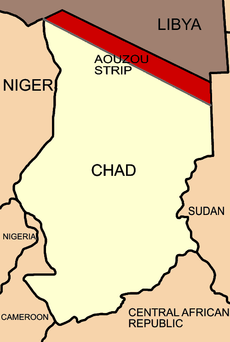| UN
Security Council Resolution 910 | ||
|---|---|---|
 Aouzou Strip (red) | ||
| Date | 14 April 1994 | |
| Meeting no. | 3,363 | |
| Code | S/RES/910 ( Document) | |
| Subject | Chad–Libya | |
Voting summary |
| |
| Result | Adopted | |
| Security Council composition | ||
Permanent members | ||
Non-permanent members | ||
| ||
United Nations Security Council resolution 910, adopted unanimously on 14 April 1994, after considering a letter by the Secretary-General Boutros Boutros-Ghali advising of his intention to send a reconnaissance team to the disputed Aouzou Strip between Chad and Libya, the Council decided to exempt the reconnaissance mission from a provision in Resolution 748 (1992) that imposed international sanctions on Libya.
Acting under Chapter VII of the United Nations Charter, the Council recognised that the mission would require the use of United Nations aircraft which required exemption in order to monitor the Libyan withdrawal. The Council welcomed the agreement between the Government of Chad and Government of Libya at Sirte on 4 April 1994 concerning the implementation of the judgment delivered by the International Court of Justice on 3 February 1994 regarding the sovereignty of the Aouzou Strip. [1] The Secretary-General was requested to keep the Council informed on flights made under the current resolution.
See also
- Case Concerning the Territorial Dispute (Libya v. Chad)
- Chadian–Libyan conflict
- Foreign relations of Libya
- List of United Nations Security Council Resolutions 901 to 1000 (1994–1995)
References
- ^ Shaw, Malcolm Nathan (2003). International law. Cambridge University Press. p. 915. ISBN 978-0-521-82473-6.
External links
-
 Works related to
United Nations Security Council Resolution 910 at Wikisource
Works related to
United Nations Security Council Resolution 910 at Wikisource - Text of the Resolution at undocs.org
- 1994 United Nations Security Council resolutions
- 1994 in Libya
- 1994 in Chad
- Chadian–Libyan War
- United Nations Security Council resolutions concerning Libya
- United Nations Security Council resolutions concerning Chad
- United Nations Security Council sanctions regimes
- April 1994 events
- Sanctions against Libya
| UN
Security Council Resolution 910 | ||
|---|---|---|
 Aouzou Strip (red) | ||
| Date | 14 April 1994 | |
| Meeting no. | 3,363 | |
| Code | S/RES/910 ( Document) | |
| Subject | Chad–Libya | |
Voting summary |
| |
| Result | Adopted | |
| Security Council composition | ||
Permanent members | ||
Non-permanent members | ||
| ||
United Nations Security Council resolution 910, adopted unanimously on 14 April 1994, after considering a letter by the Secretary-General Boutros Boutros-Ghali advising of his intention to send a reconnaissance team to the disputed Aouzou Strip between Chad and Libya, the Council decided to exempt the reconnaissance mission from a provision in Resolution 748 (1992) that imposed international sanctions on Libya.
Acting under Chapter VII of the United Nations Charter, the Council recognised that the mission would require the use of United Nations aircraft which required exemption in order to monitor the Libyan withdrawal. The Council welcomed the agreement between the Government of Chad and Government of Libya at Sirte on 4 April 1994 concerning the implementation of the judgment delivered by the International Court of Justice on 3 February 1994 regarding the sovereignty of the Aouzou Strip. [1] The Secretary-General was requested to keep the Council informed on flights made under the current resolution.
See also
- Case Concerning the Territorial Dispute (Libya v. Chad)
- Chadian–Libyan conflict
- Foreign relations of Libya
- List of United Nations Security Council Resolutions 901 to 1000 (1994–1995)
References
- ^ Shaw, Malcolm Nathan (2003). International law. Cambridge University Press. p. 915. ISBN 978-0-521-82473-6.
External links
-
 Works related to
United Nations Security Council Resolution 910 at Wikisource
Works related to
United Nations Security Council Resolution 910 at Wikisource - Text of the Resolution at undocs.org
- 1994 United Nations Security Council resolutions
- 1994 in Libya
- 1994 in Chad
- Chadian–Libyan War
- United Nations Security Council resolutions concerning Libya
- United Nations Security Council resolutions concerning Chad
- United Nations Security Council sanctions regimes
- April 1994 events
- Sanctions against Libya